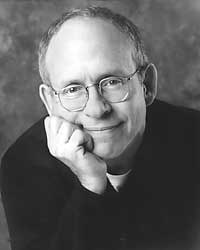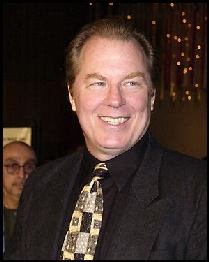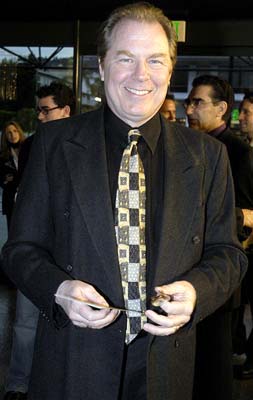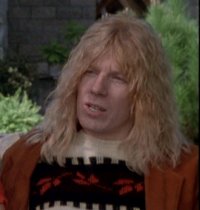 Hopless Pictures is part of IFC’s new "Deranged" block of Friday night programming, debuting tonight. It also includes an all new Greg The Bunny as well as a mockumentary series called The Festival. Hopeless Pictures is a cartoon about the inner-workings of a movie studio staffed with, as is the case in real life, completely dysfunctional people. It was created by Bob Balaban, probably one of my favorite people, whose career has been long and fascinating, and includes films like Close Encounters of the Third Kind and Gosford Park. The shows stars Michael McKean as Mel Wax, the dyspeptic head of the studio who is always on the phone with his psychiatric, played by Jon Katz, but not as Dr. Katz. Close, though.
Hopless Pictures is part of IFC’s new "Deranged" block of Friday night programming, debuting tonight. It also includes an all new Greg The Bunny as well as a mockumentary series called The Festival. Hopeless Pictures is a cartoon about the inner-workings of a movie studio staffed with, as is the case in real life, completely dysfunctional people. It was created by Bob Balaban, probably one of my favorite people, whose career has been long and fascinating, and includes films like Close Encounters of the Third Kind and Gosford Park. The shows stars Michael McKean as Mel Wax, the dyspeptic head of the studio who is always on the phone with his psychiatric, played by Jon Katz, but not as Dr. Katz. Close, though.
Last week McKean and Balaban came to New York to promote the show. I usually hate when we have two people sitting in together at a junket, but these two had a great interplay, mostly because they’re smart and funny guys who have known each other and worked together for a few years. They share a great, dry wit, so read all their responses with that in mind.
The interview was being held at the Regency Hotel, in the New Yorker suite, which reminded Bob Balaban of the founder of that magazine, William Shawn:
Balaban: I play William Shawn in a new movie, actually.
McKean: What movie?
Balaban: Capote, it’s called. I do nothing that William Shawn probably had done, but I play William Shawn.
McKean: Did you know that William Shawn-
Balaban: Wally Shawn’s father.
McKean: Also was considered as the first victim of Leopold and Loeb. When he was a kid. They settled on Bobby Franks for some reason.
Balaban: He was in the same pool?
McKean: Yeah. They were thinking of someone to kill, and they almost killed William Shawn.
Balaban: How did you know that? Did Wally tell you?
McKean: No.
Balaban: Does Wally know?
McKean: He might not. I cannot tell you where I heard it, because I don’t remember, but I’ve known it my whole life.
 Q: Wow. Turns of fate.
Q: Wow. Turns of fate.
Balaban: You’re either going to be dead when you’re 8 or you’re going to invent the New Yorker.
Q: So Bob, what made you decide to bring your talents to a cartoon show?
Balaban: The devil.
I’ve always been interested in animation – not always, but a long time I was. I ran a website ten years ago, a science fiction web site for Joe Roth, and I just didn’t know what to put on my show. I did a lot of documentaries and things about special effects and movie stuff and interviews. So I decided I would have an animated series, and I did two episodes of something called Very Lost in Space. That’s how I began my minor path towards animation.
I enjoyed Very Lost in Space and I uncovered an artist named Brian Smith, who I loved. We worked out a style together that was very minimalist, and I’ve said looks like the characters were run over with a truck. I thought Dr. Katz, which we revere, and Jonathan Katz is on this show as the psychiatrist Dr. Stein – Dr. Katz found a way that really suited, really looked great with psychiatry. It was simple and organized and jittery. People were neurotic because their lines were neurotic, I guess, which suited it. We worked until we found a way that looked jangled, like people are just about to jump out of their skin all the time. It had rules. You could have breasts if you were a sexy woman, but nobody ever looks like anybody real actually, so we went out of our way to think that the drawing would not look sexually attractive to anybody. We have real people on the show – they don’t want to look like themselves. My friends who appear as directors or famous people don’t want to see caricatures of themselves.
McKean: And I would never have been cast as Mel Wax. Too tall, too blonde and too WASPy.
Balaban: Yeah, you probably wouldn’t have been Mel. Yet you can throw a Yiddish phrase around with the best of Ed Begley.
Q: You have a lot of projects these days. Is that because of the nominations that came with Gosford Park?
Balaban: I don’t really know. I had a great time making that movie, and being in it, which wasn’t supposed to be but we couldn’t find anybody more famous who would do it. So I ended up in London and I had a great time. I have found in my life that nothing has happened the way it was supposed to happen. The movies I was in where they said, ‘After this, everything will change!’, nothing ever did. The one or two times where there was a thing I forgot I did – I was nominated for a Tony Award 20 years ago for something I forgot I had done!
McKean: What was the show?
Balaban: The Inspector General, the Gogol play. I was in it during a newspaper strike. I had no idea I would have gotten good reviews, evidently. I was in it the month qualifying for the award, so 12 months later I was away somewhere and I was told I had been nominated. I thought this was a fantasy thing, since I didn’t remember doing anything. So nothing ever turns out the way I think it will, so I believe that in my life – and in the life of most sort of whatever I am, character actor people – it’s an accumulation.
I guess if we had won the Academy Award people would have sent me projects. I don’t notice anything happening. I notice doors opening a little easier, more access. I probably gained a little bit in confidence. I always trusted my instincts – not because they’re great instincts, it’s all we have. You can’t trust marketing departments and things.
McKean: Because, as William Goldman puts it, nobody knows anything.
Balaban: One person liking it for real represents a certain percentage of the population. But somebody setting out to figure out what a percentage of the population would like could be a hundred percent wrong. This way one person might be happy.
So I think my confidence has been increased minorly. And I had a great time going to the Vanity Fair party. They can’t take that away from me.
Q: What other projects do you have in the works?
Balaban: I am producing and directing a movie in the fall called Bernard and Doris, about Bernard the  butler and Doris Duke the rich woman. Susan Sarandon is playing Doris Duke and Ralph Fiennes is Bernard. It’s a script I found floating around. We’re doing it with the company that produces, with us, the animation series.
butler and Doris Duke the rich woman. Susan Sarandon is playing Doris Duke and Ralph Fiennes is Bernard. It’s a script I found floating around. We’re doing it with the company that produces, with us, the animation series.
Q: It’s funny the way cable works. HBO will pick a movie and run it every day for six months. Parents is one of those movies, where they’ll run it daily forever.
Balaban: Well nobody told the residuals department.
Q: You’ve only directed one other picture since then?
Balaban: I’ve directed three movies altogether. I made Parents. Then I did a movie called something, that you’re referring to. [The movie he doesn’t want to talk about is My Boyfriend’s Back, a film about a dead teenager who woos the girl of his dreams] There was also an interesting little movie that I wrote and produced and directed called The Last Good Time, with Armin Mueller-Stahl, Lionel Stander that wonderful crusty old actor who is no longer with us, and Olivia D’abo, a wonderful young actor. And Maureen Stapleton, one of my most favorite people. I made that, and that was almost seven years ago.
Q: Parents seems like a very personal horror movie.
Balaban: Yes, it was completely personal. I didn’t write it, but when I found it I went, ‘That reminds me of my childhood,’ so I set the movie in my childhood and basically kind of veered it over to my Midwestern upbringing. Which is not to talk about stuff.
Q: Michael, do you find that it’s tough to get a character out when you only have your voice to work with?
McKean: I don’t know. I don’t think I have the discipline to make the distinction, to be honest.
Balaban: You use a little more treble.
McKean: I think this, from my point of view, is a story about a guy in a deep hole of his own digging. I feel like I’m sometimes calling to the outside world a little bit, but I try to make it as real as possible. You’ve seen what the characters look like – the unreality is handled beautifully by experts. It’s kind of similar to radio. In a way. But of course in radio, when you really couldn’t see it, you had to say, ‘Don’t! Stop! Don’t shoot me with that gun you’re holding in your left hand!’ We don’t have to do that, because we know there will be pictures. But listen, a guy pleading with his ex-wife on the telephone to not completely clean him out – that’s going to be pretty much the same size or shape whether it’s animated or live action.
Balaban: On the last episode, in the divorce she tries to get the frozen embryos for herself.
Q: Is there a specific producer you based your character on?
McKean: No. For one thing, I never got to know too many producers terribly well. With the exception of people I knew before they were producers. I knew Rob Reiner when he was, quote unquote, just an actor. He later on became a very successful director and producer. Bob I know from more recently, I’ve only known Bob for ten years. But I don’t think I’m basing it on anybody at all. What I think I did in this case was to put me in those situations. I wanted to be as realistic as possible.
Q: Bob, do you think there’s a point when we have too much insidery Hollywood comedy? It seems to be a very popular genre lately.
Balaban: Yes. But I believe that there’s always room for something if it does it well, and interestingly. We’re just a workplace comedy. If we were only about information about movies and how you get movies done – I think there’s a limit to how many Project Greenlights you can have. That is that thing, and I think it’s wonderful and I like it a lot. But I think hopefully in our case we’re as weak or as strong as our characters are.
McKean: I’m always reminded of the guy at Parlaphone Records who, when he heard the Beatles’ demo, said guitar bands were on their way out. He was probably right, in a certain sense, there probably had been too many of them. But there hadn’t been a Beatles yet.
Not that we’re the Beatles.
Balaban: And by the way, people might hate it and the show may not be –
McKean: Hopefully some people will hate it. Otherwise we’re not doing our job.
Balaban: I think that’s guaranteed. But if we end up being successful, we won’t be successful because we’re about the movie business, we’ll be successful because we’re about characters you recognize and they’re interesting because they’re in trouble. And people in deep trouble do desperate things, and that’s  funny. They scramble. It’s much more fun to watch people who look cool but aren’t.
funny. They scramble. It’s much more fun to watch people who look cool but aren’t.
Q: Did Celebrity Charades do well?
McKean: It’s a great, great show! I want that apartment.
Balaban: You can go to that apartment. I’ll show you.
McKean: But I can’t live there.
Balaban: That’s true, you can’t afford it. Yeah, it did well. We may do more of them, I can’t tell you for sure.
Q: You shot that over a couple of weeks?
Balaban: Three days. I’m tired of eating too much, I’m tired of playing charades and I’m tired of talking so much.
McKean: But the food was good, I bet.
Balaban: The food was great. My friend Andy Arons, who owns The Gourmet Garage, he came and he cooked. He stayed there and was on TV. He made stuff that was free since we had a very low budget. And The Gourmet Garage is delicious. And they cater, too!
Q: Could Hopeless Pictures ever work on ABC or NBC?
Balaban: We couldn’t do this on ABC or NBC.
McKean: IFC is the perfect home because they’re not going to be cutting stuff for content. They’re not going to be giving Bob or anybody else notes about anything, because IFC is really about – gee, it says it right in the title. It’s about the independence of the artist. Look, I don’t think IFC likes everything it puts on. I don’t like everything they put on. But it’s there because this is the right place for it.
Balaban: In some ways it’s easier for us to do this show on IFC than other cable networks. Just the personalities involved. And I think the fact is that they do like independent film, and it’s not just a marketing ploy.
McKean: And IFC isn’t looking to turn into anything. They’re doing more original programming now, obviously, but it isn’t like their dream is to turn into TNT and do The Shield Meets The Wolf Man.
Q: I would watch that!
McKean: That is not a bad idea!
Q: What’s up with For Your Consideration? You’re both in that?
Balaban: Yes, Michael and I shall be in it, occupying similar divisions of the set. We work together.
McKean: We’re kind of partnered in a set on this new film.
Q: Any chance of another Spinal Tap tour?
McKean: If we could figure out any way to make money doing it. We never have. We’ve paid for the tour time and again. Actually, last time we played we did OK. But we like it when Jack Black calls us up and says, do you want to do a gig with Tenacious D for this charity. Then you go, yeah not even a question. It’s just fun, it’s not on us, it’s just a great bill. We’ll do stuff like that. I don’t see us designing another tour. For one thing, it’s a very selective audience, like Tony Hendricks’ character says in the movie. Boy, whenever we show up, they do too. We pretend to be rock stars and they pretend to like us. So it’s a perfect relationship.
But it doesn’t have the ease. We can’t get Butterfingers candy bars to sponsor us, or Depends.
Q: But if you did, would the Folksmen from A Mighty Wind be on the bill?
McKean: That does wear you out. Especially with Chris with the bald cap. And Harry’s in drag now, he’s a woman now.
Q: You keep the characters going?
McKean: Absolutely. The Folksmen are now two males and a female.
Balaban: There was a tiny A Mighty Wind tour, which Harry did in drag.
McKean: We played five cities. But I don’t know. We still love doing it. We almost did a BBC special for the last election, but someone made the mistake of telling the BBC about it and we started getting all these  notes.
notes.
The other thing is that we’re all busy doing other things. We were asked to do some CGBGs benefits, and we would have jumped at that, but we’re all kind of involved in other stuff.
Balaban: They did a great thing. You weren’t dressed as Spinal Tap, but Christopher Guest was honored by the Museum of Modern Art a couple of months ago and Michael and Harry came to be part of the thing, and I interviewed them at one point. But they got up and did songs.
McKean: Tap songs and A Mighty Wind songs, but out of character. We never did that before.
Balaban: How did that feel?
McKean: It was great. They did the thing for me at the Newport Folk Festival, and we did the same thing. I invited the other guys. It’s better than doing a speech. More fun.
Q: Does anyone ever kick around the idea of a sequel to Spinal Tap?
McKean: You know, the star of that first movie was the form. The documentary form. If we did another one of those it would be just, please give us ten dollars each, and that doesn’t appeal to us.
Balaban: And you would sit there and compare it. Even if it was a favorable comparison, all you would do was compare it.